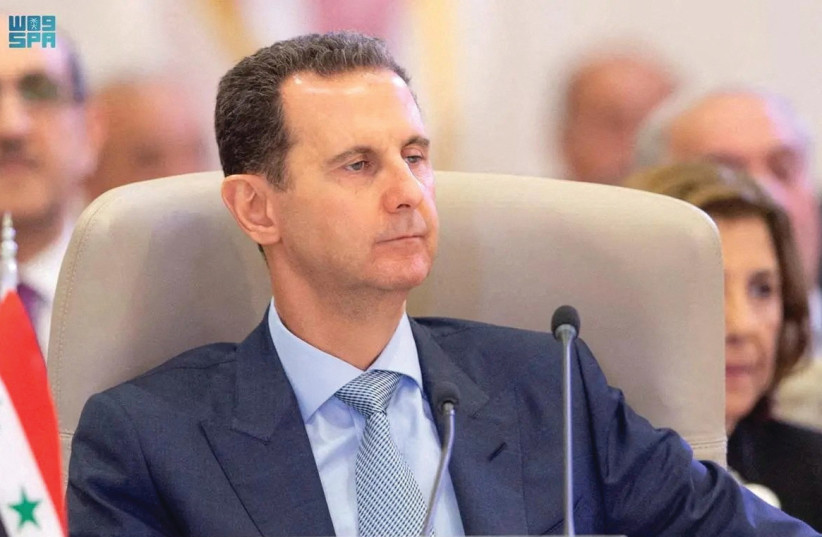Why Israel needs to focus on Syria’s drug trafficking – analysis
Israel is joining a growing list of countries that are concerned about the Syrian regime’s drug production and trafficking.
A statement by Foreign Minister Eli Cohen called for a regional coalition to halt the expansion of Syria’s drug production and trafficking, at an international conference on drug trafficking on Friday. This is important because it joins the US, Jordan and other countries in putting a spotlight on how opioids, such as captagon, have harmed the region. This also marks an important milestone for the US because US Secretary of State Antony Blinken pushed for this recent Ministerial meeting to launch a Global Coalition to address Synthetic Drug Threats.
This is also a unique opportunity for regional integration on policies related to confronting drug smuggling. This scourge harms all the countries in the region and can destabilize countries. Iran, for instance, is linked to militant and militia groups that destabilize Syria and Iraq.
An opportunity to collaborate toward a mutual goal
The US supports the Abraham Accords and issues that affect the region. Towards that end confronting drugs can be a way for Israel to work with other countries. Jordan, for instance, is very keen to stop the drug smuggling. Jordan sent its foreign minister to Damascus to discuss this issue last week and the ministry put out a statement over the weekend.
The meeting highlighting the drug trade as part of this new global coalition, was attended by countries such as Saudi Arabia, UAE, Morocco and others. These are all key responsible countries when it comes to promoting stability and common interests in the region.
 SYRIAN PRESIDENT Bashar Assad attends the Arab League summit in Jeddah last month. (credit: SAUDI PRESS AGENCY/REUTERS)
SYRIAN PRESIDENT Bashar Assad attends the Arab League summit in Jeddah last month. (credit: SAUDI PRESS AGENCY/REUTERS)What are some of the issues involved?
The formation of the coalition is an important step to address the escalating threat of industrial-size drug production, Jordan says.
“The new international coalition will allow us to work together to combat the production, trafficking and distribution of industrial drugs…The global danger of industrial drugs and the vast resources available to its manufacturers and smugglers, requires a joint international effort to confront this danger,” Jordan’s foreign ministry said.
أكد نائب رئيس الوزراء ووزير الخارجية وشؤون المغتربين @AymanHsafadi، اليوم في مداخلة له في الاجتماع الوزاري للتحالف الدولي لمواجهة تهديد المخدرات الصناعية: – تشكيل التحالف خطوة مهمة للتصدي لتهديد المخدرات الصناعية المتصاعد، ومواجهة الانتشار الخطير لها. – التحالف الدولي الجديد… pic.twitter.com/54SkcKm8oG
— وزارة الخارجية وشؤون المغتربين الأردنية (@ForeignMinistry) July 7, 2023
Announcing this initiative in June, the US said that “synthetic drugs represent a grave and growing risk to the health and safety of Americans and people around the world. Illicit fentanyl and other synthetic opioids are involved in more deaths of American adults under 50 than any other cause. Other countries face challenges from dangerous synthetic drugs including tramadol, methamphetamine, captagon, MDMA, and ketamine. Recognizing the urgent need for collective action, the United States is rallying the international community to address this pressing challenge head-on.”
Blinken said “on July 7, 2023, I will convene and host a virtual Ministerial meeting, bringing together dozens of countries and international organizations, to launch a Global Coalition to Address Synthetic Drug Threats. This coalition seeks to unite countries worldwide in a concerted effort to prevent the illicit manufacture and trafficking of synthetic drugs, identify emerging drug trends, and respond effectively to their public health impacts.”
The recent meeting is an important step
Israel’s participation is very important as well. Cohen, who recently returned from Greece, added an important voice to the countries that are worried about the drug trade in the region. This will be one more foundational block in where Israel plays an important role in regional integration and also messages that resound with other Abraham Accords countries and peace partners.
This means Israel joins with Jordan, Egypt, the Gulf states and Morocco regarding these concerns. This is the new diplomatic format where the US continues to show regional leadership, but where regional countries take the lead.
This is one of the many models for the future of the region. It is similar to the models of trade and multi-lateral agreements and groups like the Negev Forum, I2U2, Greece-Cyprus and Israel; as well as energy deals in the East Med and discussions about regional air defense initiatives.





Comments are closed.